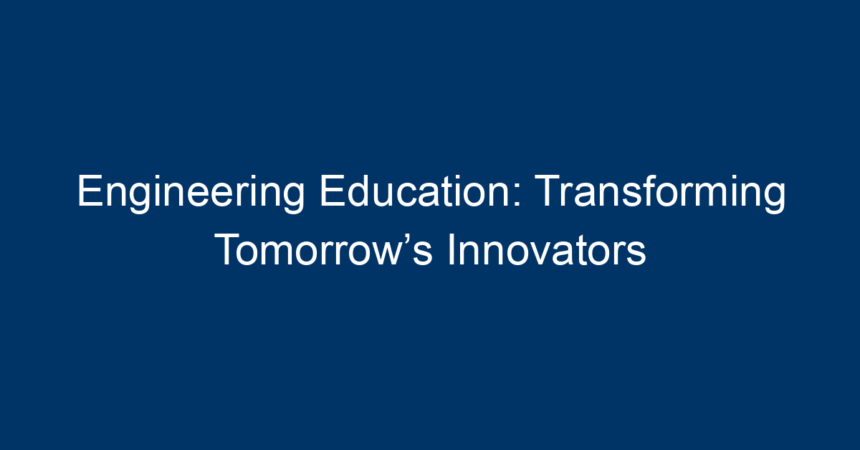In an era defined by rapid technological advancement and global challenges, the role of engineering education has never been more pertinent. This field doesn’t just create engineers; it cultivates innovators poised to tackle the world’s pressing issues. As we delve into the intricacies of engineering education, we will explore its significance, current trends, and future challenges. Through this exploration, we aim to provide insights on how to harness the power of engineering education to foster creativity and problem-solving.
The Importance of Engineering Education
Building a Strong Foundation
Engineering education lays the groundwork for critical thinking and analytical skills. It equips students with the ability to approach complex problems methodically, fostering a mindset that is crucial for innovation. Moreover, the hands-on experience provided in labs and workshops allows budding engineers to apply theoretical concepts in practical scenarios. This blend of theory and practice creates a solid foundation, enabling graduates to tackle real-world challenges.
Addressing Global Challenges
The world faces an array of challenges, from climate change to healthcare accessibility. Engineering education plays a pivotal role in developing solutions. By incorporating sustainability and social impact into the curriculum, institutions are training students to think beyond conventional boundaries. For instance, developing green technologies or creating efficient healthcare systems relies heavily on the innovative spirit nurtured through engineering education.
Interdisciplinary Collaboration
Modern problems are rarely confined to a single discipline. Engineering education fosters interdisciplinary collaboration, marrying principles of engineering with biology, economics, and social sciences. This collaborative spirit can lead to groundbreaking innovations, such as bioengineering advancements or smart city planning. Students learn not just to engineer solutions but to engage with other fields, broadening their perspectives.
Trends Reshaping Engineering Education
Emphasis on Project-Based Learning
Project-based learning (PBL) is gaining traction in engineering education. This methodology encourages students to engage in real-world projects, enhancing their learning experience. By addressing tangible problems, students develop critical skills such as teamwork, communication, and project management. PBL integrates theoretical knowledge with practical application, bridging the gap between a classroom and the industry.
The Rise of Online and Hybrid Learning
The digital transformation has permeated education, and engineering is no exception. Online and hybrid learning models offer students access to quality education from anywhere in the world. This flexibility enables institutions to reach a broader audience while maintaining educational standards. Additionally, online platforms can facilitate collaboration across borders, fostering a global perspective.
Focus on Soft Skills and Ethics
While technical skills are paramount, soft skills such as communication, leadership, and ethical considerations are increasingly emphasized in engineering education. Institutions are incorporating workshops and courses that target these skills, preparing students for teamwork and leadership roles in the workplace. Furthermore, discussions around the ethical implications of engineering decisions are crucial; future engineers must understand the social and environmental impact of their work.
Innovations in Engineering Education
Integration of Technology
The integration of technology in engineering education is transforming traditional teaching methods. Tools such as virtual reality (VR) and simulation software provide immersive learning experiences. Students can engage in complex engineering scenarios, from designing structures to testing machinery, all within a virtual environment. This hands-on experience enhances understanding and retention of engineering principles.
Maker Spaces and Innovation Labs
Many engineering institutions are establishing maker spaces and innovation labs, encouraging students to prototype and experiment freely. These spaces are equipped with tools and resources that enable students to turn ideas into tangible products. The spirit of innovation thrives in such environments, providing a platform for creativity and collaboration among peers.
Global Engineering Programs
To prepare students for a globalized workforce, many engineering schools now offer international programs and exchange opportunities. These programs expose students to diverse cultures and practices, enriching their educational experience. Learning to navigate different engineering standards and practices prepares students for international collaboration, a crucial aspect of modern engineering projects.
Challenges Facing Engineering Education
Keeping Pace with Technological Advances
One of the primary challenges in engineering education is keeping pace with rapid technological advancements. As industries evolve, curricula must adapt to incorporate emerging technologies and methodologies. Institutions must invest in continuous faculty development and curriculum updates to ensure that students receive relevant and up-to-date education.
Bridging the Skills Gap
Despite the increasing demand for engineers, a noticeable skills gap persists. Employers often find that recent graduates lack certain practical skills necessary for the workplace. Engineering education must focus on bridging this gap through internships, co-op programs, and collaborations with industry partners. By providing students with real-world experiences, institutions can enhance the employability of their graduates.
Fostering Diversity and Inclusion
Engineering has long been criticized for its lack of diversity. To create a truly innovative future, engineering education must foster inclusivity. Encouraging underrepresented groups to enter engineering fields is vital for broadening perspectives and driving creativity. Institutions should implement outreach programs, scholarships, and inclusive teaching practices to support diverse cohorts of students.
Conclusion: Actionable Insights for Future Innovators
Engineering education is at a transformative crossroads, with the potential to shape not just skilled professionals, but also visionary leaders.
For Educators
- Incorporate Practical Experiences: Emphasize project-based learning, internships, and collaboration with industry to provide students with real-world experiences.
- Focus on Interdisciplinary Approaches: Encourage collaborations across different fields to help students develop holistic solutions to complex problems.
- Emphasize Soft Skills Training: Integrate courses on communication, leadership, and ethics into the curriculum to prepare students for future challenges.
For Students
- Engage in Hands-On Learning: Seek out maker spaces or innovation labs to enhance your practical skills and creativity.
- Pursue Global Experiences: Take advantage of study abroad programs or international projects to broaden your perspective and cultural understanding.
- Advocate for Diversity: Be an ally in fostering diversity within engineering programs, initiate discussions on bias, and support inclusion initiatives.
For Institutions
- Adapt to Emerging Technologies: Regularly update curricula to include new technologies and methodologies in the engineering field.
- Promote a Culture of Innovation: Create environments that encourage experimentation and creativity, allowing students to explore and innovate freely.
- Bridge the Skills Gap: Collaborate with industry partners to develop programs that address the skills needed in the workplace.
By embracing these insights, we can elevate engineering education to not only meet current challenges but also anticipate and innovate for the future. Together, we can nurture the next generation of engineers who will lead the charge in creating innovative solutions to improve our world.




